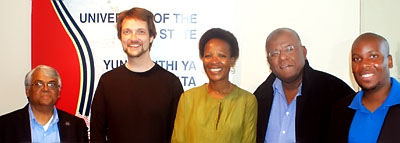Latest News Archive
Please select Category, Year, and then Month to display items
17 June 2020
|
Story Dr WP Wahl

The Division of Student Affairs (DSA) prioritises innovation to meet the challenges of food insecurity and malnutrition among students. To this end, several student volunteers and student governance structures are collaborating with the DSA on various initiatives.
During 2019, various conversations were held about the possibility of creating a health-promoting food environment at the UFS where students and staff are well informed and empowered to take appropriate action regarding their food and nutritional needs. These conversations resulted in an institutional strategy to address the food environment at the UFS. Student representatives serve on a technical committee that directs the implementation of this strategy. In this regard, several initiatives have already been launched.
Students from residences and other student communities have planted vegetable gardens on the Bloemfontein Campus with the assistance of KovsieACT and the Faculty of Natural and Agricultural Sciences. Students and staff are already harvesting and distributing vegetables to needy students every week. Measurements were put in place to continue this during the COVID-19 period. The following vegetables were planted: spinach, cabbage, beetroot, broccoli, cauliflower, and carrots.
Food parcels, donated by Tiger Brands and Gift of the Givers, are continuously handed out by DSA staff and student volunteers. In this regard, 540 food parcels have already been handed out on the Bloemfontein Campus during the COVID-19 period alone. During the same time, 117 students received food parcels on the Qwaqwa Campus. The innovation of this food parcel project rests on the fact that business, NPOs, UFS students, and DSA staff are collaborating to address food insecurity and malnutrition.
More collaborative initiatives will be implemented over the next 12 months. The DSA staff and students are already working with the Department of Dietetics and Consumer Sciences to create information packages about the preparation of low-budget nutritious meals.
Related article:
Vegetable tunnels established to continue the fight against food insecurity
New York academic pays visit to UFS
2010-08-02
 |
Prof. Teboho Moja, a professor of Higher Education at NYU, paid a successful visit to the UFS. Here are, from left: Mr John Samuel, Interim Director: International Institute for Studies in Race, Reconciliation and Social Justice, UFS; Dr Bryan Urbsaitis, Assistant-Director of Study Abroad, Pace University, USA; Prof. Moja; Prof. Jonathan Jansen, Rector and Vice-Chancellor, UFS; and Dr Olihile Sebolai, Directorate Research Development, UFS.
Photo: Arthur Johnson
|
|
Prof. Teboho Moja, a professor of Higher Education from New York University (NYU), paid a fruitful visit to the University of the Free State (UFS). During her visit Prof. Moja, who is originally from South Africa, engaged with various stakeholders to further strengthen relations between the UFS and NYU.
Prof. Moja’s research focus is on the change in higher education and the implications of globalisation on higher education systems. As part of her visit to the UFS, Prof. Moja delivered a public lecture, entitled “Diversity oriented transformation for Teaching and Learning”. The lecture was presented by the Directorate Research Development and the International Institute for Studies in Race, Reconciliation and Social Justice.
Prof. Moja studied at the University of the Witwatersrand and obtained her Doctorate in Philosophy at the University of Wisconsin-Madison in the United States of America (USA).
In 1998 she became the first black woman to be appointed as chairperson of the council of the University of South Africa (UNISA). She is also an honorary professor at the University of Pretoria (UP).
On her visit to the UFS Prof. Moja was accompanied by Dr Bryan Urbsaitis from Pace University in New York and Ms Gina Canterucci from NYU. She also led a group of postgraduate students in International Education Studies. These students interacted with fellows from the Grow Our Own Timber Programme of the UFS. The interaction greatly contributed towards enhancing both student groups’ acuity on academic and social matters.
|